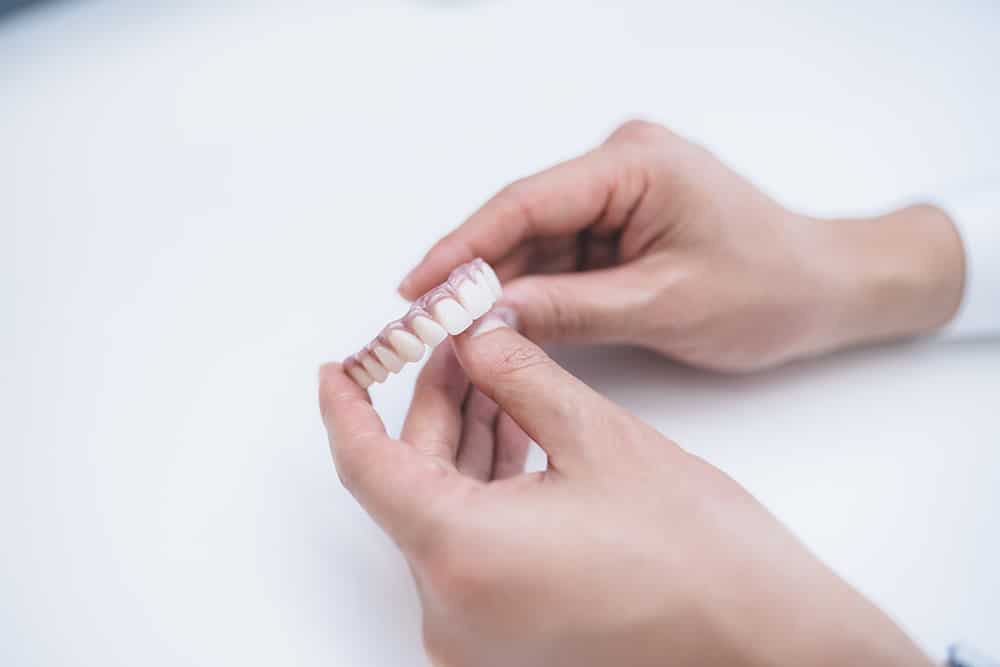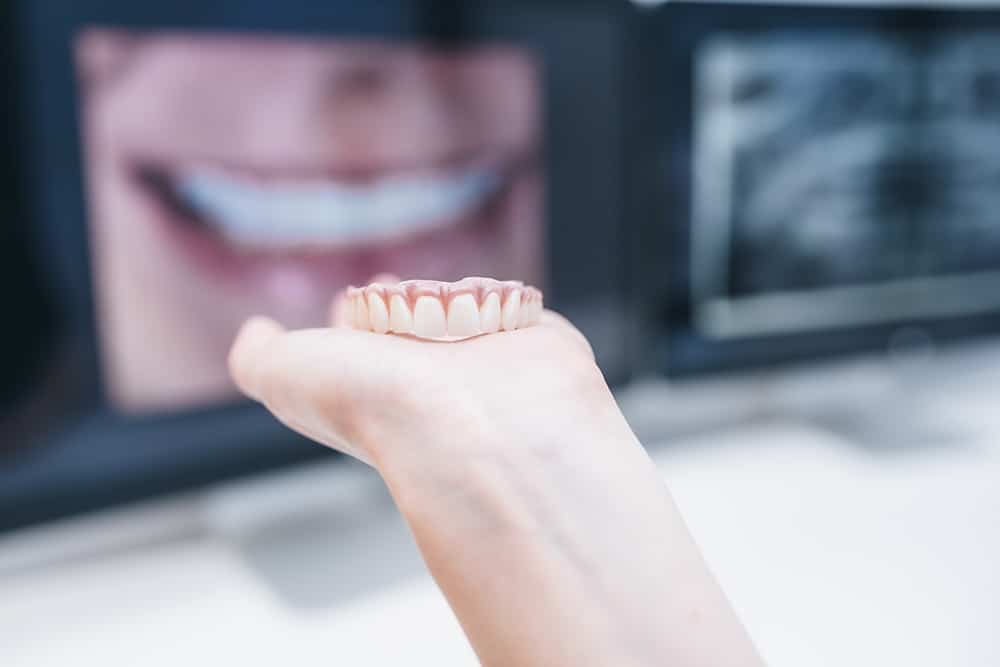Implant Supported Dentures - Affordable Dental Treatment


Dentures are not fixed to your jaw; they rest on the gum and affect your facial structure. They also risk slipping while chewing. Many people with dentures experience their jaw bones becoming thinner due to the pressure from chewing.
However, expert dentists have gotten a better option for replacing missing teeth with dentures. These are implant supported dentures. Individuals interested in improving their damaged or lost teeth can go for these dentures.
Implant-supported dentures serve as a middle floor between traditional dentures that use adhesive and the more expensive full-mouth dental implants.
What are Implant Supported Dentures?
These are full dentures that require dental implants. They are not conventional dentures that sit on the gum line. They are also known as Implant-Supported Overdentures and are ideal for people who have lost all their upper or lower teeth.
Implant-supported dentures provide comfort and better facial aesthetics than traditional dentures. Most individuals who use traditional dentures complain about their instability making implant-supported dentures an excellent option if you’re more concerned about the security and stability they provide.
The implant dentures don’t require any adhesive to insert. Also, this type of denture is detachable. You can remove and insert as many times as you want. And just like traditional dentures, it requires cleaning and maintenance.

Types of Implant Supported Dentures
There are different types of the implant-supported dentures. You can go with either fixed or removable implant-supported dentures.
There is also the implant stabilized denture.
Fixed
Fixed implant dentures are sometimes called ‘Screw-in.’ These implants restore your chewing function completely but require more implants than the removable ones. You don’t need to remove the fixed implant denture for cleaning. They are already set in place.
Fixed dentures are stronger than their removable counterpart. An implant dentist or oral surgeon can only extract them; they are fixed to implant posts.
The all-on-4 is a fixed dental treatment. It is best for people who have bone loss due to long-term denture overuse.
Removable
Removable implant dentures are known as ‘Snap-in dentures.’ This type of implants can restore your chewing ability, but not completely like fixed implants. They require four dental implants to stabilise the upper jaw and two for the lower jaw.
You can detach these dentures from the implant post and reattach them yourself. They also wear out quickly and are the most cost-effective option.
They are partially implanted in retained dentures and partially supported by the gums at the back of your mouth.
Implant Stabilised
Implant stabilised is an implant added to the mouth to keep the dentures in place. The conventional or regular dentures tend to move around a lot in the mouth and sometimes contain adhesive whose taste affects all food and drink put in the mouth. The denture stabilisation inserts implants to the jawbone and then attaches the dentures to stabilise them in the mouth. They help the dentures become rooted in the mouth.
Two types of implant stabilised dentures include ball-retained dentures and bar-retained dentures.
Ball retained dentures have a ball and a socket that hold the dentures in place. Each implant in the jaw connects to a socket that aligns them with the denture. The denture becomes simple for you to remove and clean.
On the other hand, bar-retained dentures place a metal bar on an abutment on the implants. Once you’re wearing the denture, the clips hold the denture.
Implant supported dentures cost
Implant supported dentures procedure
To undergo the implant-supported denture procedure, you must have sufficient bone density. Though some dentists recommend bone grafting to support the dental implants, you must have healthy gum and a strong immune system for the procedure.
- Your first meeting with your dentist will be an initial consultation to discuss the process and care plan in more detail. You will go through the entire process and other important information with your dentist before determining if implant-supported dentures are your best option. They will as take x-rays to determine if you have enough bone density for the treatment.
- After the consultation, implants are placed in your jawbone for the first surgery. Your dentist places the implant by making a small incision and drilling a hole in the exposed bone. Your dentist does this for each implant. Then, you wait three to six months, giving the implants time to fuse to your jawbone.
- After the waiting period, a second surgery is done to expose the top of your implants. A collar is placed on each head on exposal to guide the healing. You wait for 10-14 days, after which your dentist replaces them with abutments.
- Your dentist creates a mould of the abutment in your mouth and has the implant crown made custom to fit. Your dentist also makes impressions
on your mouth and the remaining teeth. This purpose is to make the false teeth feel like your own teeth.
Recovering from implant supported dentures
After surgery, care for your implant-supported dentures like you would your natural teeth. The care involves brushing and flossing twice a day. If they are removable, always remove and clean them. Also, ensure you place them in a glass of water before bed each night.
Placing them in a glass of water prevents cracking and drying out. Or you soak them in a denture solution to disinfect them.
Get a water flosser with an implant brush. Some flossers come with a tiny brush for cleaning implants. Use the water flosser to clean hard-to-reach locations such as where the restoration and gum tissues meet. Always visit your dentist to clean and inspect your implants.
Quality
- Teeth will look and feel natural
- A proven procedure with over 10 years of research to support it
- More comfortable than your previous dentures
- Find it easier to talk
Health
- Improved facial structure
- Increased ability to chew the food you may have previously avoided
- Minimise any further bone shrinkage in your jaw
Confidence
- You could have a full set of teeth inas little as 24 hours
- Your teeth are secure with very little risk of falling out
Dental Implant Procedure



Implant Placement

Implant integration

Prosthetics
IMPLANT SUPPORTED DENTURES VS IMPLANT-RETAINED DENTURES
Implant-supported dentures use dental implants to support the force of the bite. They give the most natural look and bite. Implant-supported dentures are more expensive; they are made of high-quality materials and require a lot of dental implants.
Dental implants are used to secure implant retained dentures on the place and to hold the force of bite on the gums. They require fewer implants.
To make the right choice between implant-supported and implant retained dentures, consider diet, health, the density of the jawbone, and cost.
PROS AND CONS OF IMPLANT SUPPORTED DENTURES
As implant-supported dentures can serve as a permanent solution for damaged tooth replacement, there are many benefits and few risks involved in the treatment.
Benefits of
Implant Supported Dentures
- They are strong
- They look and feel like natural teeth
- They offer excellent stability, which in turn enables you to chew properly
- They retain and maintain a healthy jawbone
- The snap-on dentures do not need dental adhesives because the implant keeps them firmly in place. This makes them easy to wear
Cons
- Implant-supported dentures need a healthy jaw bone
- They are more expensive than conventional dentures
- Many patients may complain about wear and tear because of the removable nature of the denture
CONCLUSION
Dentures are not stable. But implant dentures are an excellent choice if you are looking for permanent dentures. Compared to loose dentures, implant dentures offer a better solution to replacing lost teeth. But do ensure you speak with your dentist to discuss your best treatment option.
Also, contact us at My Implant Dentist to find out more information about other available options. We have clinics in Perth and Brisbane, do give us a call when you need dental services. Your oral health is important.

